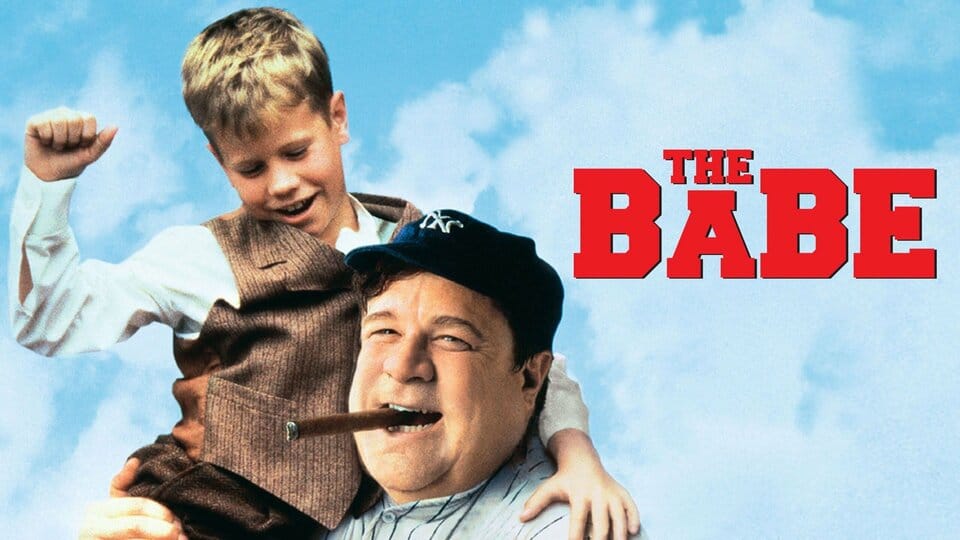
The Babe
Imagine you weren’t a miserable person who could hit home runs better than anyone else.
Let’s pretend this movie is all a lie and you were, in fact, a great American hero. The greatest of all the boys of summer. It was fun sometimes being the most famous baseball player ever.
Please, let us believe. We need our heroes.
But “The Babe” doesn’t give us one. Apart from all its other failings it’s just a bad movie, badly written and shot without much sense of time or place what it does to Babe Ruth is make him almost completely lacking in the ability to have happiness or to impart any.
Spending 115 minutes with the Babe is like being stuck in the window seat on a Greyhound next to a big guy with beer breath and cigar breath who only wants to talk about his next meal and his last broad. Babe Ruth comes off as a pathetic orphan grown into a self-destructive bore who hit homers along the way. And then, at the end, when time caught up with him once more, he didn’t get the message and nearly did away with himself as an icon.
For as many homers as he hit, Ruth would never have become an American hero in the television age not really. On radio and in print, maybe he came across like quite a guy; but seeing him here (or hearing him at least as he’s portrayed) is cringeworthy. After the magical innocence of baseball painted by “Field of Dreams.” After affirming life itself in “Bull Durham.” Here is a bubblegum card pulled out of a gutter.
It isn’t John Goodman’s fault. He plays Babe as written; watching this movie gives you that sinking feeling that there were many sides of Ruth that could have been played by Goodman (and still might work).
But John Fusco’s screenplay doesn’t seem to like Babe very much. It shows him as an overgrown, recalcitrant kid who had one skill: He could hit the ball. And then it shows him growing into a human pig, wenching and cheating on those who loved him, drunk during many of his games, small and jealous, not much of a teammate, losing his temper and screaming at the fans whose little trot around the bases looked like the gait of a constipated alderman.
Much has been made of the film’s use of Wrigley Field (in Los Angeles) and a park in Danville. They’re supposed to re-create the look of the diamonds where Ruth played. But it seems like we keep seeing the same two parks with subtitles trying to tell us we’re in Baltimore or Boston or wherever.
There don’t seem to be many people in those stands, either. There is no baseball here. No peanuts or popcorn or roar of crowd.
The part of Babe’s first wife, played by Trini Alvarado, is that of a nice girl who finally cant take it anymore with the stories about his raids on the brothels and insistence on three girls at a time. The second wife is a Ziegfeld Follies girl played by Kelly McGillis; she’s been around the block and is less easily shocked. She stays with the Babe out of loyalty and stubbornness, we gather, not love.
Loyalty doesn’t run much thicker than this to organized baseball. Ruth is paid well by the Yankees while he’s hitting but once his legs and eye go there’s no love or loyalty lost between them. He ends up in Boston where his last days are shown as a mix of anticlimax shame betrayal.
They hit all the high points here. The dying kid in the hospital, whom Ruth promises he’ll hit two home runs for in next game.
The “called shot” in the World Series. The home run record that still stands today except for an asterisk.
But do we really need that maudlin scene at end of movie when we already feel like shit where a young guy follows Ruth off field after his final game, introduces himself as kid whose life was saved by those two homers and gives back ball that Babe autographed next to his hospital bed? I mean come on.
Watch The Babe For Free On Gomovies.
.jpg?w=1024&resize=1024,1024&ssl=1)
.jpg?w=1024&resize=1024,1024&ssl=1)
.jpg?w=1024&resize=1024,1024&ssl=1)
.jpg?w=1024&resize=1024,1024&ssl=1)
.webp?w=1024&resize=1024,1024&ssl=1)
.jpg?w=1024&resize=1024,1024&ssl=1)
.jpg?w=1024&resize=1024,1024&ssl=1)
.jpg?w=1024&resize=1024,1024&ssl=1)